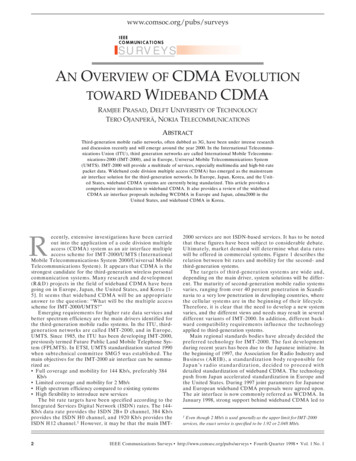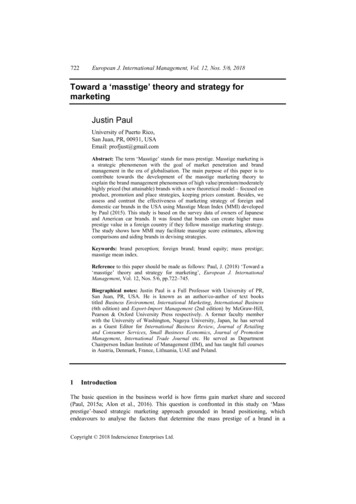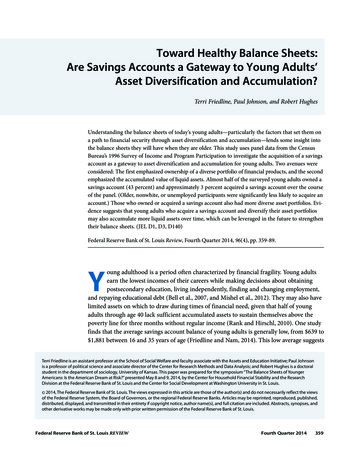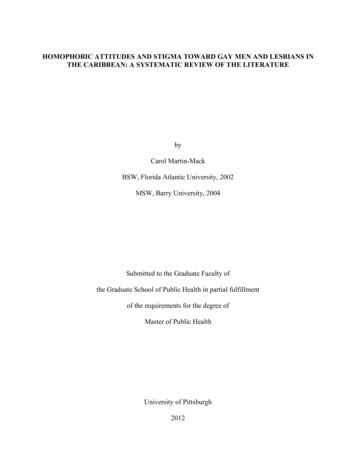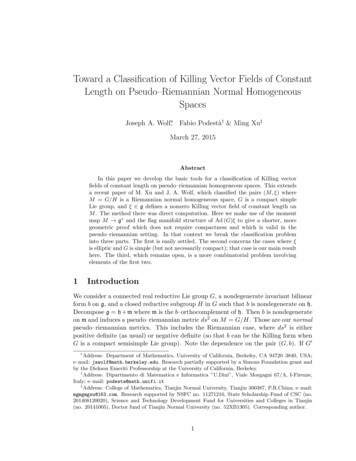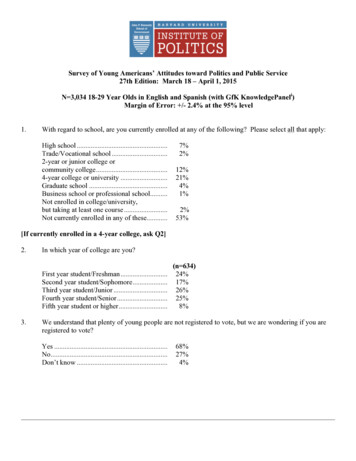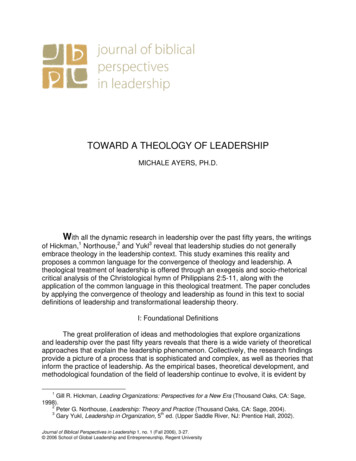
Transcription
TOWARD A THEOLOGY OF LEADERSHIPMICHALE AYERS, PH.D.With all the dynamic research in leadership over the past fifty years, the writingsof Hickman,1 Northouse,2 and Yukl3 reveal that leadership studies do not generallyembrace theology in the leadership context. This study examines this reality andproposes a common language for the convergence of theology and leadership. Atheological treatment of leadership is offered through an exegesis and socio-rhetoricalcritical analysis of the Christological hymn of Philippians 2:5-11, along with theapplication of the common language in this theological treatment. The paper concludesby applying the convergence of theology and leadership as found in this text to socialdefinitions of leadership and transformational leadership theory.I: Foundational DefinitionsThe great proliferation of ideas and methodologies that explore organizationsand leadership over the past fifty years reveals that there is a wide variety of theoreticalapproaches that explain the leadership phenomenon. Collectively, the research findingsprovide a picture of a process that is sophisticated and complex, as well as theories thatinform the practice of leadership. As the empirical bases, theoretical development, andmethodological foundation of the field of leadership continue to evolve, it is evident by1Gill R. Hickman, Leading Organizations: Perspectives for a New Era (Thousand Oaks, CA: Sage,1998).2Peter G. Northouse, Leadership: Theory and Practice (Thousand Oaks, CA: Sage, 2004).3Gary Yukl, Leadership in Organization, 5th ed. (Upper Saddle River, NJ: Prentice Hall, 2002).Journal of Biblical Perspectives in Leadership 1, no. 1 (Fall 2006), 3-27. 2006 School of Global Leadership and Entrepreneurship, Regent University
JOURNAL OF BIBLICAL PERSPECTIVES IN LEADERSHIP4omission that theological considerations of leadership are not penetrating the literatureof leadership, nor keeping pace in terms of advancement. One reason may beunderstood at a foundational level. While theology attempts to explain God,4 leadershipis essentially man-centered as it is anthropological and sociological in nature.5Investigating in greater detail the definitions of theology and leadership aids inunderstanding this divergence; it also builds a basis for the interrelation between thetwo.Theology DefinedGarrett states that theology is “the ordered consideration or study of God.”6 As iscommon in other fields of study, the long history of theological studies is as varied asthe authors who pursue such studies and reflects multidimensional strains of analysisand reporting. For instance, some theologians approach theology from a pure historicalperspective by simply examining diverse theologians in history and their theologies.7Others speak of theology in a philosophical way, dealing almost exclusively withphilosophical, linguistic, or sociological matters as a way of explaining God.8 Karleenasserts that this view of theology attempts to organize data from all sources concerningGod and his activities (e.g., history, philosophy, logic, law, and other fields) and oftenseeks to explain God without significant reference to the Bible.9 Alternatively, Hodgediscusses that there are theologians that approach theology as a science. He claimsthat a scientific approach in any field of study should move beyond the tactilerecordation of data to the systematic organization of that data so that meaning may beassigned.10 The science of theology must therefore include something more than amere knowledge of facts. It must embrace an exhibition of the internal relation of thosefacts, one to another, and each to all.The comments by Hodge lay the foundation for understanding the evolution of acommon approach in biblical theology that pursues the systemization of biblical matterinto a coherent a posteriori schema. This approach has become known as “systematictheology.” Discussing the nature of systematic theology, Hodge states that the Bible isno more a system of theology than nature is a system of chemistry or mechanics. Wefind in nature the facts that the chemist or mechanical philosopher has to examine andfrom them ascertain the laws by which they are determined. Likewise, the Biblecontains the truths that the theologian has to collect, authenticate, arrange, and exhibitin their internal relation to each other. Hodge states, “This (process) constitutes thedifference between biblical and systematic theology. The onus of the former is toascertain and state the facts of Scripture. The office of the latter is to take those facts,4Millard Erickson, Christian Theology (Grand Rapids, MI: Baker Books, 1985)Robert Layton, An Introduction to Theory in Anthropology (Cambridge, UK: Cambridge UniversityPress, 1998).6James L. Garrett, Systematic Theology, vol. 1-2 (Grand Rapids, MI: William B. Eerdmans, 1995), 2.7Charles Hodge, Systematic Theology, vol. 1 (1872; repr. Oak Harbor, WA: Logos ResearchSystems, Inc., 1997), 1-2.8Paul S. Karleen, The Handbook to Bible Study: With a Guide to the Scofield Study System (NewYork: Oxford University Press, 1987).9Ibid.10Hodge, Systematic Theology.5Journal of Biblical Perspectives in Leadership 1, no. 1 (Fall 2006), 3-27. 2006 School of Global Leadership and Entrepreneurship, Regent University
JOURNAL OF BIBLICAL PERSPECTIVES IN LEADERSHIP5determine their relation to each other and to other cognate truths, vindicate them, andshow their harmony and consistency.”11From systematic approaches to biblical theology have arisen such categories asCalvinistic theology, Reformed theology, Armenian theology, Covenant theology,Dispensational theology, and others.12 All reflect assumptions and paradigms that drivethe discussion and practice of systematic theology, as well as nuances of differentiationwithin each paradigm.Delimiting LeadershipAs opposed to theology that seeks to explain God, leadership concerns itself withthe person of the leader and the dynamics between leaders and followers that result ina form of influence.13 Yet, in delimiting leadership one may become as perplexed asBurns, “leadership is one of the most observed and least understood phenomena onearth.”14 As in Baker’s speech, some people see leadership effectiveness solely relatedto the accomplishment of important tasks: “leadership is knowing what needs to bedone . . . and getting it done.”15 Increased evidence in recent years seems to suggestthat social effectiveness skills are crucial: “leadership is a social influence exerted onindividuals and/or groups to achieve goals.”16 Congruent with the social skillsparadigm—and though much debate remains about its veracity in relation toleadership—emotional intelligence has emerged as one of the most notable leadershipeffectiveness constructs.17Other definers of leadership emphasize certain sophisticated leadershipbehaviors: “contextual thinking, directional clarity, creative assimilation, reciprocalcommunications, change orchestration, drive and perseverance.”18 Bass’s model oftransformational leadership stands atop this line of thought. He outlines four behaviorsthat represent effectiveness in leadership as these behaviors transform followers:individualized consideration, intellectual stimulation, inspirational motivation, andidealized influence.19 Jesus described an effective leader as quintessentially one with acapacity to serve and love his or her followers.20 Additionally, some researchers see11Ibid., 3.Paul P. Enns, The Moody Handbook of Theology (Chicago, IL: Moody Press, 1997, c1989).13Northouse, Leadership: Theory and Practice.14James MacGregor Burns, Leadership (New York, NY: Harper & Row, 1978), 158.15James Baker, former US Secretary of State, “Coalition Building during the Gulf War” (speech,October 26, 2001).16Philip A. Lewis, Transformational Leadership (Nashville, TN: Broadman & Holman Publishers,1996), 61.17Douglas L. Prati et al., “Emotional Intelligence, Leadership Effectiveness, and Team Outcomes,”International Journal of Organizational Analysis 11, no. 1 (2004): 21-40.18Human Resource Development Press, (2004),www.hrdpressonline.com/product info/leadership effectiveness profile.htm.19Bernard M. Bass, “From Transactional to Transformational Leadership: Learning to Share theVision,” Organizational Dynamics 18, no. 3 (1990): 19-36.20Luke 22:24-27 (New International Version).12Journal of Biblical Perspectives in Leadership 1, no. 1 (Fall 2006), 3-27. 2006 School of Global Leadership and Entrepreneurship, Regent University
JOURNAL OF BIBLICAL PERSPECTIVES IN LEADERSHIP6other matters as predictive of leader success. These include situational elements,21 theskill to embrace chaos and ambiguity,22 and the quality and willingness of followers.23While the above definitions of leadership reflect only a small percentage of theways people have sought to explain leadership over the past fifty years, the examplesillustrate the variety of assumptions and the multitude of definitions of the construct.The Need for ConvergenceThough there is multidimensionality within the parameters of the definitions oftheology and leadership, the limited scope of the definition of each resulting in theexclusive objects of study move the fields of theology and leadership naturally apart.Reflecting this drift, many Bible colleges and seminaries ignore the training of pastors inleadership implying that it is not within their purview and, in effect, convey the messagethat if a minister understands the nature of God and the doctrines of faith, that isenough.24 Yet extensive work by authors such as Welch, Barna, and Schwarz into thedeclining effectiveness of church leaders demonstrates that theological education aloneis not adequate. In an era where church leaders receive more theological training thanever, Barna asserts through his studies that leadership is the primary problem facingthe future of evangelical churches.25 Welch’s investigation shows that graduates ofseminaries, facing now the realities of ministry, regret that they did not receive moreleadership training.26Schwartz’s groundbreaking research goes even further. His study in the 1990sinto over 1,000 churches across the globe reveals that formal theological training ofchurch leaders had a generally negative correlation to both church growth and overallquality of churches.27 This may be due in part to a pastor’s excessive reliance uponteaching and doctrine (at the expense of exercising leadership) to grow the church andimpact people. Welch, Barna, and Schwartz depict that many people extensively trainedin Bible and theology lack the ability to contextualize that knowledge and make iteffectually alive in the hearts of people. These concerns fall within the domain ofleadership studies.While theology often excludes considerations of leadership, the writings ofNorthouse28 and Yukl29 reveal that leadership studies do not generally embracetheology in the leadership context. Yet, the number of books describing the problems ofleadership, the lack of moral and ethical clarity in the principles and practices of21Paul Hershey and Ken Blanchard, Management of Organizational Behavior (Englewood Cliffs, NJ:Prentice-Hall Inc., 1982).22Karl E. Weick, The Social Psychology of Organizing (New York, NY: McGraw-Hill, 1979).23Ira Chaleff, The Courageous Follower: Standing up to and for our Leaders (San Francisco: Barrett& Koehler, 1995).24Robert H. Welch, Church Administration: Creating Efficiency for Effective Ministry (Nashville, TN:Broadman & Holman Publishers, 2005).25George Barna, ed., Leaders on Leadership: Wisdom, Advice, and Encouragement on the Art ofLeading God's People, The Leading Edge Series (Ventura, CA: Regal Books, 1997).26Welch, Church Administration: Creating Efficiency for Effective Ministry.27Christian A. Schwartz, Natural Church Development (St. Charles, IL: ChurchSmart Resources,1996).28Northouse, Leadership: Theory and Practice.29Yukl, Leadership in Organizations.Journal of Biblical Perspectives in Leadership 1, no. 1 (Fall 2006), 3-27. 2006 School of Global Leadership and Entrepreneurship, Regent University
JOURNAL OF BIBLICAL PERSPECTIVES IN LEADERSHIP7leadership, the egocentric outcomes of leadership, the inner dysfunctions of leaders,and the relationship of these dysfunctions to behaviors are profuse.30 From the literatureit seems that leaders trained intensely and exclusively in the theories, skills, andstrategies of leadership have no guarantee of well-being or effectiveness. The writingsabove reflect a moral and spiritual void in leadership that results in a lack of clarity,security, and purpose so necessary for leaders today. These authors providesubstantial evidence as to the need for something more. Could theology speak to theseissues and possibly other matters relevant to leadership theory?Concerns and observations in this discussion beg the question: Is there a needfor a theology of leadership, and could a convergence of the concepts enhance andenlighten both subjects? Or, could a combination of the concepts, rather than speakingto each field separately, provide a holistic paradigm that empowers scholars andChristian ministers alike? To answer these questions, this article posits a theology ofleadership by establishing a common language to aid the convergence of the fields.Then, a theological treatment of leadership is offered by applying the common languageto the Christological hymn of Philippians 2:5-11, one of the earliest biblical textsdescribing the leadership, purpose, and focus of the Christ.31II: Establishing a Common LanguageIn spite of the quintessential disparity between theology and leadership, there isprecedence for convergence and common language. Some scholars argue thattheology only reflects man’s social constructions of God; thus, it provides strong linksbetween theology and sociology (e.g., “sociology of religion”).32 Within the subcategoryof study called “anthropology of religion,” anthropologists investigate religion in historyand culture and shed light on the ways man has understood God and practicedallegiance to the Deity.33 Theologians and anthropologists have long used the term“anthropomorphism” (anthropos, man; morphe, form), meaning “a phrase employed to30Les Carter and Jim Underwood, The Significance Principle (Nashville, TN: Broadman & Holman,1998); Kevin Cashman, Leadership from the Inside Out (Provo, UT: Executive Excellence, 1998); RichardFoster, Money, Sex and Power (San Francisco, CA: Harper & Row; London: Hodder & Stoughton, 1985);John W. Gardner, Self Renewal: The Individual and the Innovative Society (New York, NY: Harper &Row, 1963); Os Guinness, Character Counts (Grand Rapids, MI: Baker Books, 1999); James M. Kouzesand Barry Z. Posner, Credibility: How Leaders Gain and Lose It, Why People Demand It (San Francisco,CA: Jossey-Bass, 1993); Gordon MacDonald, Ordering Your Private World (Nashville, TN: ThomasNelson, 1985); Gary L. McIntosh and Samuel D. Rima, , Sr., Overcoming the Dark Side of Leadership(Grand Rapids, MI: Baker Books, 1997); Reggie McNeal, A Work of Heart (San Francisco: Jossey-Bass,2000); Michael R. Milco, Ethical Dilemmas in Church Leadership (Grand Rapids, MI: Kregel, 1997);Samuel D. Rima, Leading from the Inside Out (Grand Rapids, MI: Baker Books, 2000); Thomas J.Stevenin, People Power (Chicago, IL: Northfield, 1996).31John F. Walvoord, Jesus Christ our Lord (Chicago: Moody Bible Institute, 1969).32Max Weber, Sociology of World Religions: Introduction er/world/intro/world intro.html#ide-int; Ronald L. Johnstone,Religion in Society: A Sociology of Religion, 7th ed. (Upper Saddle River, NJ: Prentice Hall, 2003); AlanAldridge, Religion in the Contemporary World: A Sociological Introduction (Cambridge, UK: Polity Press,2000).33John R. Bowen, Religions in Practice: An Approach to the Anthropology of Religion, 2nd ed. (UpperSaddle River, NJ: Allyn & Bacon Publishing, 2002); Michael Lambeck, ed., A Reader in the Anthropologyof Religion (Ames, IA: Blackwell Publishers, 2002).Journal of Biblical Perspectives in Leadership 1, no. 1 (Fall 2006), 3-27. 2006 School of Global Leadership and Entrepreneurship, Regent University
JOURNAL OF BIBLICAL PERSPECTIVES IN LEADERSHIP8designate any view of God’s nature that conceives of him as possessing or exercisingany attributes common to him with mankind.”34 Some theologians and philosophersbroaden the term by claiming that any and all language describing Deity isanthropomorphist in nature, i.e., we cannot understand God but through humanconceptions, attributes, and words.35 Johnson and Duberly posit that the history ofepistemology itself has vacillated between the paradigms of positivism that claimobjective, external reality discovered via the scientific method and a conventionalist orpostmodern epistemology describing knowledge as socially constructed throughsubjective assumptions.36 These sociological, anthropological, theological, andepistemological assertions in relation to the knowledge of God provide for the fusion oftheology and leadership and blur the lines between the two offering a more inclusiveand paradoxical approach to the analysis.In leadership studies, Greenleaf’s seminal work brought the phrase “servantleadership” into existence.37 His research posits that leadership practiced in a mannerconsistent with the divine attributes of Jesus’ servant character is effective andinfluential. Though by omission it is readily seen that the construct of servant leadershiphas not yet become a recognized part of conventional leadership literature, Greenleafintroduced practical theology into leadership theory and laid the groundwork for futureempirical validation of the construct.38Edwards states that attempting to converge and integrate different concepts anddisciplines of study begins with developing a common language.39 Figure 1 illustratesthis detail. The language must reveal and remain consistent with the conceptualrealities of each subject without changing the essence of each.Philosophy has long been the arbiter of language defining ways of speakingabout meaning and reality.40 Some have called philosophy “the spawning ground ofconceptual frameworks which then become the bases for new sciences.” 41 Edwardsstates that whether or not this is what philosophy actually is, it has undoubtedly beenone of philosophy’s main functions. Due to philosophy’s role in determining languagethat is universally valid and applied across disciplines, traditional terms that containphilosophical validity are sought for this discussion and provide credibility to theargument for the convergence of theology and leadership. These terms are ontology,methodology, and teleology.34Hodge, Systematic Theology, 131.Erickson, Christian Theology; Garrett, Systematic Theology, vol. 1-2.36Phil Johnson and Joanne Duberly, Understanding Management Research (London: Sage, 2000).37Robert K. Greenleaf, Servant Leadership (New York, NY: Paulist Press, 1977).38Myra L. Farling, A. Gregory Stone, and Bruce E. Winston, “Servant Leadership: Setting the Stagefor Empirical Research,” The Journal of Leadership Studies (1999); Paul Wong and Don Page, “ServantLeadership: An Opponent-Process Model and the Revised Servant Leadership Profile” (paper, RegentUniversity, Virginia Beach, VA, 2003); Kathleen A. Patterson, “Servant Leadership: A Theoretical Model”(paper, Regent University, Virginia Beach, VA, 2003).39Paul Edwards, ed., The Encyclopedia of Philosophy, vols. 4, 7, and 8 (New York: MacMillanCompany and The Free Press, 1967).40Edwards, The Encyclopedia of Philosophy, vols. 4, 7 and 8; William L. Reese, Dictionary ofPhilosophy and Religion (Atlantic Highlands, NJ: Humanities Press.1980); Chris Rohmann, A World ofIdeas (New York: Ballantine Books, 1999); Simon Blackburn, The Oxford Dictionary of Philosophy(Oxford, UK: Oxford University Press, 1994).41Edwards, The Encyclopedia of Philosophy, vol. 4, 389.35Journal of Biblical Perspectives in Leadership 1, no. 1 (Fall 2006), 3-27. 2006 School of Global Leadership and Entrepreneurship, Regent University
JOURNAL OF BIBLICAL PERSPECTIVES IN LEADERSHIPTheologyACommonLanguage9LeadershipFigure 1. Creating a common language.OntologyDerived from the Greek ontos (“being”) and logos (“knowledge”), the classicphilosophic term “ontology” means the knowledge of being and refers to what issometimes called “first science” or “first philosophy.”42 Ontology is concerned with whatit means to “exist,” i.e., to be, and leads to a priori thought or knowledge arising from aconcept or principle that precedes empirical verification.43 Throughout the centuries,ontological arguments have primarily occurred in relation to God’s existence, but havealso perpetuated other philosophical concepts such as “sufficient reason,” “necessarybeings or things,” and “contingency.”44 Many modern philosophers see ontology interms of a logical and linguistic form stating that something exists dependent upon thevalues we assign to the vocabulary we happen to use when referring to it.45 Thisadjectival association of the term is more common today in many fields of studysignified with the phrase “ontology of” and defines for disciplines—such as linguistics,law, information science, and genetics—forms of basic structure in the “essence” or“first matters” of things.4642Rohmann, A World of Ideas, 41.Erickson, Christian Theology; Rohmann, A World of Ideas; Blackburn, The Oxford Dictionary ofPhilosophy.44Blackburn, The Oxford Dictionary of Philosophy.45Rohmann, A World of Ideas.46Alexander Maedche, Ontology Learning for the Semantic Web, The Kluwer International Series inEngineering and Computer Science, vol. 665 (Norwell, MA: Kluwer Academic Publishers, 2002); BranSelic, Richard Benjamins, Pompeu Casanovas, and Aldo Gangemi, eds. Law and the Semantic Web:Legal Ontologies, Methodologies, Legal Information Retrieval, and Applications (New York: Springer,2005); Steven Gross, Essays on Linguistic Context Sensitivity and Its Philosophical Significance (Oxford,UK: Routledge, 2001); Richard C. Lewontin, et al., Modern Genetic Analysis: Integrating Genes andGenomes, 2nd ed. (New York: W. H. Freeman. 2002).43Journal of Biblical Perspectives in Leadership 1, no. 1 (Fall 2006), 3-27. 2006 School of Global Leadership and Entrepreneurship, Regent University
JOURNAL OF BIBLICAL PERSPECTIVES IN LEADERSHIP10Theology and ontology. The major a priori or rational argument for God’sexistence is the ontological argument.47 Reese and Erickson state that the ontologicalargument was first formulated by Anselm (AD 1093-1109) in his Proslogion when hestates that God is the being that nothing greater can be conceived and that God isconceptually necessary.48 According to Anselm, these two points logically lead to theconclusion that God must exist.49 The ontological argument has been promulgatedthrough the centuries by people such as Descartes, Spinoza, Leibniz, Barth, andHartshorne.50 Immanuel Kant is most widely known for challenging its validity.51 For thesake of this discussion, it is important to note that the ontological argument for Godmoves from the definition of his nature as a perfect being to the conclusion that heexists.Evolving from the ontological argument, evangelical theologians such asErickson, Garrett, and Strong describe God in terms of his character and nature.52 Justas God is non-contingent and necessary in and of himself, his attributes can bedescribed in the form of that which is absolute and relative:The absolute attributes of God are those which he has in himself. He has alwayspossessed these qualities independently of his creation. The relative attributes,on the other hand, are those which are manifested through his relationship toother subjects and inanimate objects. Infinity is an absolute attribute; eternity andomnipresence are relative attributes representing the relationship of his unlimitednature to the finite objects of the creation.53Erickson posits some of the absolute or self-contained qualities of God (we might evensay “ontological qualities”) as spirituality, personality, life, infinity, and constancy.The theological discussion by Erickson of God’s absolute and relative attributesallows us to understand more fully ontology as it is often referred to today.54 God’sabsolute attributes that are noncontingent and self-existent (his ontological qualities)could be thought of in terms of “who God is,” i.e., his nature and essence. On the otherhand, his relative attributes that exist in relation to his creation are the expressions ofhis nature. These we witness in the tactile world. They allow us to know God,understand who he is, and relate to him. They could be termed “what God does” andthey provide clues to his nature.Ontology of leadership. Bennis states, “I am surer now than ever that the processof becoming a leader is the same process that makes a person a healthy, fullyintegrated human being.”55 Thompson concurs, “It is our position that the leadership47Erickson, Christian Theology.Reese, Dictionary of Philosophy and Religion; Erickson, Christian Theology.49Reese, Dictionary of Philosophy and Religion.50Ibid.51Erickson, Christian Theology.52Erickson, Christian Theology; Garrett, Systematic Theology, vol. 1-2; Augustus H. Strong,Systematic Theology (Old Tappen, NJ: Fleming H. Revell, 1979).53Erickson, Christian Theology, 267.54Erickson, Christian Theology.55Warren Bennis, On Becoming a Leader, rev. ed. (New York: Perseus Publishing, 2003), xxiv.48Journal of Biblical Perspectives in Leadership 1, no. 1 (Fall 2006), 3-27. 2006 School of Global Leadership and Entrepreneurship, Regent University
JOURNAL OF BIBLICAL PERSPECTIVES IN LEADERSHIP11qualities that will be required of corporate executives are not skills that can belearned. . . . Our premise is that leadership is not exceptional, but the naturalexpression of the fully functional personality.”56 Bennis and Thompson reflect theunderstanding that leadership begins with the person of the leader. They would arguethat leadership is not primarily about what one does, but first a matter of who one is. Inother words, we lead from who we are.Yet general research in the discipline of leadership has not thoroughlyconsidered the inner phenomena of leadership nor investigated ontological aspects ofleaders that affect behavior. Among other authors, Palmer illustrates the need to do so.He says that many leaders possess deep insecurity about their identity and worth andthus exhibit behavior that undermines leadership. Their leadership actions flow frominsecurity; instead of leading for the benefit of others and the organization, they lead forthe purpose of proving themselves as being good, right, effective, or competent.57Gergen also spoke of the inner disposition of leaders and the external effect of thatdisposition. He used the example of former President Richard Nixon stating, “At onemoment he could be splendidly remote, almost regal, and in the next, snarling andangry at any hiss that came from the bushes.”58 Hendricks may have summarized theargument most succinctly when he said, “The greatest crisis in the world today is acrisis of leadership. And the greatest crisis in leadership is a crisis of character.”59Consistent with the contemporary philosophical and theological use of the term“ontology” as described earlier, I reserve the phrase “ontology of leadership” for thatsphere concerned with the inner, a priori nature of the leader and define it as a newframework by which to investigate the innate needs, views of reality, internal disposition,and hidden dynamics of leaders, thereby making manifest any evidence of leadershipbehavior.MethodologyThe term “methodos,” strictly speaking, means “following a way” from the Greekmeta (“along”) and odos (“way”).60 Edwards stated that in philosophy “method” refers tothe specification of steps that must be taken to achieve a given end: “The nature of thesteps and the details of their specifications depend on the end sought and on the varietyof ways of achieving it.”61 Speaking of “methodology,” he notes the term as the branchof the philosophy of science that takes upon itself the examination and critical analysisof the special ways in which the general structure of theory finds its application inparticular scientific disciplines.62 Blackburn discusses methodology as the general study56John W. Thompson, Corporate Leadership in the 21st Century (1991),www.acumen.com/pdf/corporate.pdf, 1.57Palmer as cited in Larry C. Spears, Insights on Leadership (New York, NY: John Wiley & Sons,1998).58David Gergen, Eyewitness to Power (New York: Simon & Schuster, 2000), 28.59Howard Hendricks (May 2003), www.dts.edu/ccl/.60Edwards, The Encyclopedia of Philosophy, vol. 4.61Edwards, The Encyclopedia of Philosophy, vol. 7, 339.62Ibid.Journal of Biblical Perspectives in Leadership 1, no. 1 (Fall 2006), 3-27. 2006 School of Global Leadership and Entrepreneurship, Regent University
JOURNAL OF BIBLICAL PERSPECTIVES IN LEADERSHIP12of method in particular fields of inquiry, e.g., science, history, mathematics, psychology,philosophy, and ethics.63Understanding methodology from Edwards and Blackburn informs the use of theterm for this discussion. In the process of developing a common language, it is rationalto move from the a priori nature of God and the leader to the praxis (or method) of each,i.e., what they “do” to accomplish their desired ends. In this sense, methodology andontology are tightly connected as methodology flows from the nature of the person ofGod and the leader. Edwards states that methodology takes upon itself the examinationof the special ways in which the general structure of theory finds its application inparticular scientific disciplines.64Methodology and theology. God’s methods flow from and are perfectly consistentwith his nature.65 Not only do we define God with ontological attributes that are selfcontained, we gain clues to his nature from his actions (see discussion of
transformational leadership stands atop this line of thought. He outlines four behaviors that represent effectiveness in leadership as these behaviors transform followers: individualized consideration, intellectual stimulation, inspirational motivation, and idealized influence.19 Jesus described an
